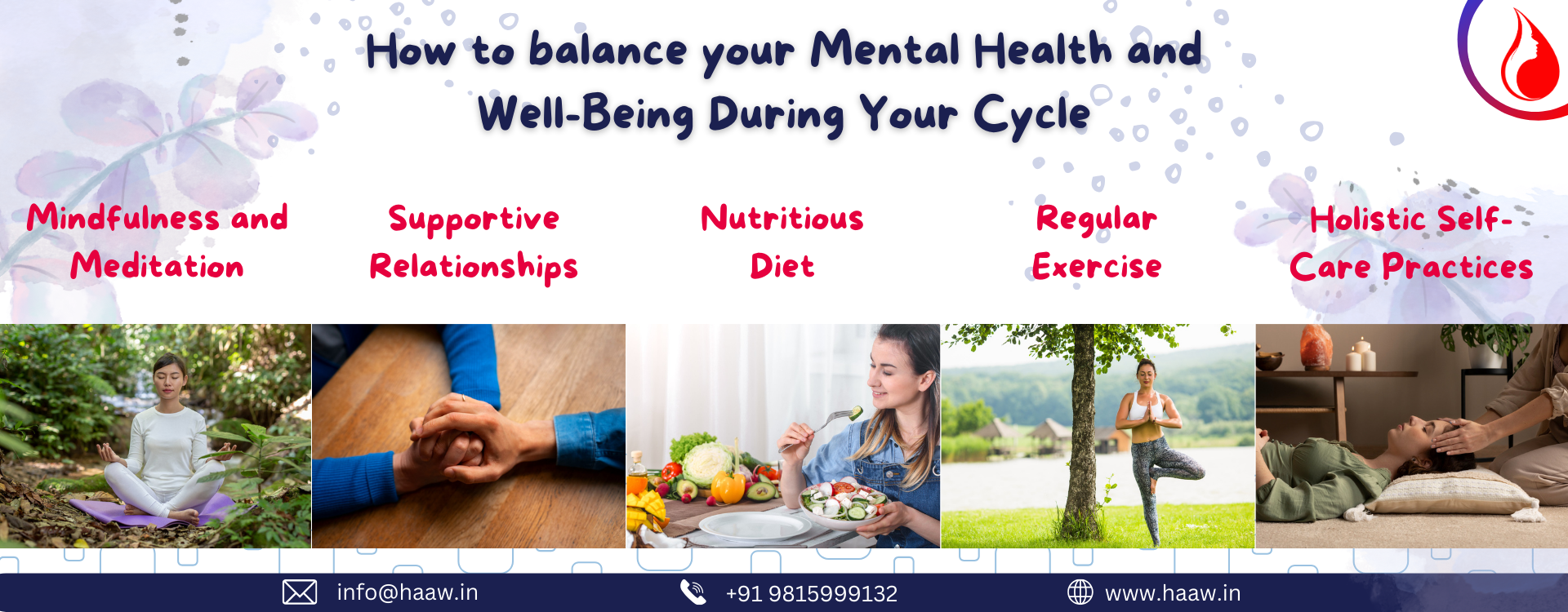
Your entire well-being is greatly impacted by your mental health, which has an impact on how you feel, think, and go about your everyday life. Hormonal changes during the menstrual cycle can have a big impact on mood, energy, and emotional stability. We’ll dive into the complex relationship between your menstrual cycle and mental health in this in-depth guide, offering helpful tips and tactics to help you develop resilience and balance at every stage.
Understanding the Menstrual Cycle and Mental Health:
Menstruation, the follicular phase, ovulation, and the luteal phase are the four phases of the menstrual cycle. Hormonal changes unique to each phase might have a significant impact on your emotional and mental well-being.
- Menstruation: Menstruation marks the beginning of the cycle, accompanied by physical discomfort and mood fluctuations for many individuals. During this phase, it’s essential to practice self-compassion and prioritize rest. Allow yourself to acknowledge any discomfort, and engage in nurturing activities that promote relaxation and comfort.
- Follicular Phase: The follicular phase starts with increasing estrogen levels after menstruation. This stage is frequently linked to more vigor and energy. During this time, concentrate on engaging in stimulating and motivating activities to maintain your mental health. Take the chance to express yourself creatively, get moving, and spend time in nature to foster a feeling of rebirth and energy.
- Ovulation: Midway through the cycle, when estrogen levels are at their highest, ovulation takes place, resulting in a spike in chemicals that improve mood, such as serotonin. Feelings of optimism, self-assurance, and increased social interactions are characteristics of this stage. Seize this great energy wave by going out and having fun, working toward your objectives, and developing deep relationships with people.
- Luteal Phase: The luteal phase, which comes before menstruation, is characterized by shifting hormone levels, particularly an increase in progesterone. Known as premenstrual syndrome (PMS), mood swings, irritability, and increased emotional sensitivity are frequent during this phase for many people. Prioritize self-care techniques that encourage calmness, stress relief, and emotional equilibrium to manage these symptoms.
Strategies for Balancing Mental Health Throughout the Cycle:
A diverse strategy is necessary to navigate the complexity of the menstrual cycle and its impact on mental health. Throughout each stage, you can keep your equilibrium and well-being by using the following strategies:
- Mindfulness and Meditation: To improve emotional regulation, lower stress levels, and develop self-awareness, incorporate mindfulness and meditation into your everyday routine. Make time each day for mindful movement exercises such as tai chi or yoga, or for mindfulness meditation and deep breathing exercises.
- Supportive Relationships: Develop a supportive network of friends, family, or support groups that understand and respect what you’ve gone through. Communicate honestly about your thoughts and feelings, and ask for help when you need it. Making a connection with people who understand your journey can provide you with a sense of security, approval, and community.
- Nutritious Diet: Throughout the menstrual cycle, optimize your diet to maintain hormonal balance and mental wellness. Make a point of eating a well-balanced diet that is high in whole grains, fruits, vegetables, lean meats, and healthy fats. Include meals high in vital minerals such as magnesium, vitamin B6, and omega-3 fatty acids; these have been connected to better hormone balance and mood regulation.
- Regular Exercise: Regular physical activity can help elevate mood, lower stress levels, and enhance general well-being. Throughout the menstrual cycle, adopt hobbies that suit your energy levels and that you love doing. Include a variety of cardiovascular, strength, and flexibility activities to support both mental and physical well-being.
- Holistic Self-Care Practices: Make holistic self-care routines a priority that feed your body, mind, and soul. Adopt a self-care routine that consists of things like journaling, going outside, taking soothing baths, being grateful, or working on creative projects. Make self-care an essential component of your everyday routine and customize your self-care routines to suit your requirements and preferences.
Conclusion:
Self-awareness, self-compassion, and active self-care activities are necessary to maintain mental health and well-being during the menstrual cycle. You can manage the ups and downs of your cycle with more resilience and empowerment if you comprehend how hormones affect mood and put holistic approaches to boost mental well-being into practice. On your path to holistic health and happiness, don’t forget to pay attention to your body, respect your feelings, and give self-care priority.